Sept. 4, 2025
Thesaurus : Doctrine

► Full Reference: J.-Ch. Roda "La preuve de la bonne exécution de la Vigilance au regard du système probatoire de Compliance (Proof that Vigilance has been properly carried out with regard to the Compliance evidence system)", in M.-A. Frison-Roche (ed.), L'Obligation de Compliance, Journal of Regulation & Compliance (JoRC) and Éditions Lefebvre - Dalloz, coll. "Régulations & Compliance", 2025, forthcoming.
____
📕read a general presentation of the book, L'Obligation de Compliance, in which this article is published
____
► English summary of this contribution : Taking the Duty of Vigilance as an illustration, the first part of the article examines the question of who must prove about that and in what order. There are no rules in the legal dispositions specific to the Vigilance Duty duty that expressly reverse the burden of proof, to the extent of placing it on the company that should demonstrate that it has correctly fulfilled its obligation. Instead, it is needed to return to general law, which makes the burden of proof vary according to the nature of the obligations incumbent on the company as a result of its Duty of Vigilance, in particular between simplly drawing up a plan and drawing it up such that its effectiveness can be expected to give rise to an obligation on those who dispute it to demonstrate its ineffectiveness. In any event, the 2 litigant parties immediately seek to fuel the debate with elements in their favour, whatever their position in the process.
This brings us to the second part of the article, devoted to the question of what constitutes proof of proper performance of the Vigilance Duty. Requiring proof of a positive fact and the constitution of a self-evidence of conformity would both be excessive and would distance the company from the Monumental Goals that are its compass. Instead, it is pertinent to distinguish between Compliance Structures, for which the proof requirements must be high, and Expected Compliance Actions, for which proof of efforts is sufficient, the obligation being only of means. In fact, companies will be wise to provide proof of their efforts as early as possible.
The third part therefore deals logically with the means of proof available to the parties. Claimants act on the principle of freedom of evidence and benefit from numerous sources of information, but the most serious difficulties arise when the facts to be proven are located outside the European Union. The company can establish that the plan has been implemented using various types of evidence, but it would appear that the standard of proof is high, even if the Vigilance Plan were to be regarded as an act of management.
________
🦉This article is available in full texte for people who follow Professor Marie-Anne Frison-Roche teaching

Oct. 14, 2024
Organization of scientific events
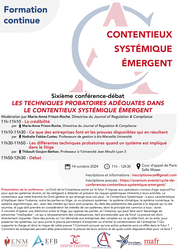
► Full Reference: Les techniques probatoires adéquates dans le Contentieux Systémique Émergent (Appropriate Evidentiary Techniques in Emerging Systemic Litigation), in cycle of conference-debates "Contentieux Systémique Émergent" ("Emerging Systemic Litigation"), organised on the initiative of the Cour d'appel de Paris (Paris Cour of Appeal), with the Cour de cassation (French Court of cassation), the Cour d'appel de Versailles (Versailles Court of Appeal), the École nationale de la magistrature - ENM (French National School for the Judiciary) and the École de formation des barreaux du ressort de la Cour d'appel de Paris - EFB (Paris Bar School), under the scientific direction of Marie-Anne Frison-Roche, October 14, 2024, 11am.-12.30pm., Paris Court of Appeal, Masse courtroom
____
► Presentation of the conference:
____
🧮Programme of this event:
Sixth conference-debate
LES TECHNIQUES PROBATOIRES ADÉQUATES
DANS LE CONTENTIEUX SYSTÉMIQUE ÉMERGENT
(APPROPRIATE EVIDENTIARY TECHNIQUES
IN EMERGING SYSTEMIC LITIGATION)
Cour d’appel de Paris, salle Masse
Presentation and moderation by 🕴️Marie-Anne Frison-Roche, Professor of Regulatory and Compliance Law, Director of the Journal of Regulation & Compliance (JoRC)
🕰️11am.-11.10am. 🎤La crédibilité (Credibility), by 🕴️Marie-Anne Frison-Roche, Professor of Regulatory and Compliance Law, Director of the Journal of Regulation & Compliance (JoRC)
🕰️11.10am.-11.30am. 🎤Ce que des entreprises font et les preuves disponibles qui en résultent (What firms are doing and evidence available as a result), by 🕴️Nathalie Fabbe-Costes, Professor of management at Aix-Marseille University
🕰️11.30am-11.50am. 🎤Les différentes techniques probatoires quand un système est impliqué dans un litige (The various evidential techniques when a system is involved in a dispute), by 🕴️Thibault Goujon-Bethan, Professor of Law at Jean-Moulin Lyon 3 University, director of the Centre patrimoine et contrats, director of the IEJ de Lyon
🕰️11.50am.-12h30pm. Debate
____
🔴Registrations and information requests can be sent to: inscriptionscse@gmail.com
🔴For the attorneys, registrations have to be sent to the following address: https://evenium.events/cycle-de-conferences-contentieux-systemique-emergent/
⚠️The conference-debates are held in person only, in the Cour d’appel de Paris (Paris Court of Appeal).
________
Updated: Sept. 1, 2022 (Initial publication: Oct. 14, 2021)
Thesaurus : Doctrine

► Full Reference: L. Rapp, "Conformité, proportionnalité et normativité" ("Compliance, proportionality and normativity"), in M.-A. Frison-Roche (ed.), Les Buts Monumentaux de la Compliance, coll. "Régulations & Compliance", Journal of Regulation & Compliance (JoRC) and Dalloz, 2022, p. 177-198.
____
📕read a general presentation of the book, Les Buts Monumentaux de la Compliance, in which this article is published
____
► Summary of the article (done by the Author): Proportionality is to the exercise of powers what subsidiarity is to the exercise of competences: an indicator as well as a limit. It determines the scope and allows for control at the same time. It sets the standard, before being a standard itself. This may explain why, in principle, it is part of the judge's office and his methods of assessment. But a study of its recent evolution shows that it is gradually moving from the ex-post to the ex-ante, which makes it possible to anticipate that it will soon become an effective tool of compliance policies and a useful normative reference. The article developments demonstrate this, by explaining how one slides from the principle of proportionality to proportionality control, from proportionality control to proportional reasoning, from proportional reasoning to compliance control, and finally, in a last desirable evolution, from compliance control to the necessary proportionality of control.
________
July 4, 2022
Adventures of the Ogre Compliance

June 19, 2022
Law by Illustrations
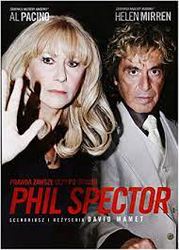
► Référence complète : Frison-Roche, M.-A., Phil Spector : Avant tout une fiction ..., qui raconte par les noms et dates précises la préparation du procès de Phil Spector, 2022
____
Qui connait l'histoire et l'industrie de la musique connait Phil Spector, celui qui dans les années 60 fut le plus grand producteur de disques, innova, lança et gagna des fortunes. Puis, il disparut parce que dans un système qui se nourrit de modes l'on disparait aussi ; il resta avec ses souvenirs et son argent. C'est plutôt sous l'angle d'un procès retentissant que les médias lui redonnèrent la couverture, puisqu'il fut poursuivi pour le meurtre d'une actrice. Proclamant d'une façon spectaculaire son innocence, il fût reconnu coupable par le jury et finit sa vie en prison. Lorsqu'il mourut en 2021 en prison à plus de 80 ans, ruiné et seul, la presse titra ainsi : "savez-vous que Phil Spector a été interprété au cinéma par Al Pacino ?".
Car dans l'autre monde qu'est non plus le monde des amateurs de musique mais le monde des amateurs de cinéma, de Phil Spector, l'on n'avait pas entendu parler. Ainsi du film qui sortit en 2013, qui retrace semble-t-il pas à pas les quelques jours précédant sa comparution devant le tribunal, ceux qui admirent celui qui est qualifié de "légende" n'ont pas entendu parlé. Et sans doute les cinéphiles ne connaissent pas cette personne.
Il faut dire que le film débute par cet avertissement : "ce film est une pure fiction qui n'a aucun rapport avec des faits qui se seraient déroulés". Et pourtant le titre même du film est : Phil Spector , c'est-à-dire un titre réduit à l'identification de la personne, pour que nul ne s'y trompe. Les noms sont exacts, les dates aussi, les faits allégués sont reproduits, les lieux également. Les perruques qu'il portait, notamment celle qu'il choisit, ainsi que l'habit, au bouton près, de mettre pour le jour où le procès s'ouvrit.


Pourquoi avoir fait cela ?
Sans doute pour ne pas avoir d'ennui, dans une affaire où la personne concernée fut condamnée pour un meurtre alors qu'il affirmait avoir été témoin d'un suicide. En effet, des personnes avaient par exemple menacé Helen Mirren de s'opposer à l'attribution de toute récompense pour jouer dans un film pour présenter d'une "façon sympathique" un personnage diabolique... L'avantage d'une fiction est qu'on rend moins de compte des personnages qui ne vivraient que sur l'écran....
Pour pouvoir aussi ajouter autant de scènes que l'on veut où le personnage, désormais "de fiction" que serait ce Phil Spector qui n'aurait donc aucun compte à rendre à Phil Spector, peut apparaître dans toute sa démesure et sa rage, notamment contre la justice et la société.
Cela permet au spectateur de voir tout le travail de l'avocate, Linda Kenney Baden, interprétée par Helen Mirren :
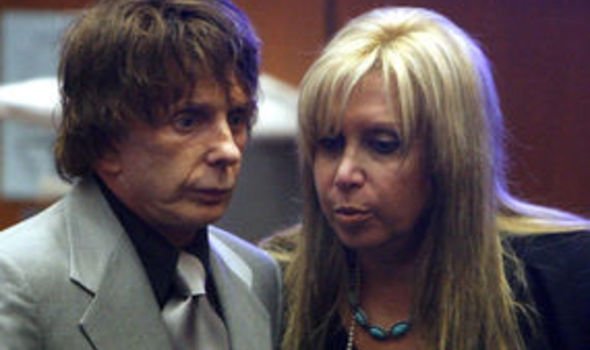
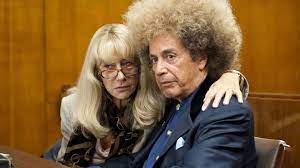
L'on peut par exemple y voir les cross-examinations simulés par lesquelles l'avocat prépare le client ou bien, à l'intérieur même du cabinet, la façon dont à tour de rôle les avocats endossent la thèse de l'adversaire.
Dans toutes ces scènes qui furent, dans la "réalité", si théâtrales dans ce procès hors-normes autour d'une personnalité hors-norme, prévenir dans ce film présenté par tous comme une biographie que tout cela ne serait que "fiction" nous montre en tant cas les effets de miroir qu'il existe toujours entre les procès et les films autour de la réalité et le récit qui en est fait.
____
March 29, 2022
Conferences
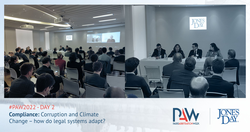
 ► Full reference: Frison-Roche, M.A., The part of Compliance Law in the fight against Corruption and Climate Change, in Paris Arbitration Week (PAW), Compliance: Corruption and Climate Change - how legal systems adapt?, Jones Day, March 29, 2022.
► Full reference: Frison-Roche, M.A., The part of Compliance Law in the fight against Corruption and Climate Change, in Paris Arbitration Week (PAW), Compliance: Corruption and Climate Change - how legal systems adapt?, Jones Day, March 29, 2022.
Debate with Mathias Audit coordinated by Claire Pauly, Vice-President of the Paris Arbitration Week.
____
► Presentation of the intervention: After the presentation made by Mathias Audit of the consideration of facts of corruption, notably by the red flags method, in an arbitration trial, it seems a low-performing system of proof in compliance: the more diligent a party is in showing that it tried to meet its compliance obligations, the more it is exposed to demonstrating its own failure to doing so. It seems a perversity … Therefore, I can understand why companies often so dislike Compliance Law because more they make efforts, more they put money and more they are punished…
But this representation is not totally exact.
My first observation is about the definitions themselves. It is particularly important to have a precise definition of “compliance obligations”, to not confuse them with obligations coming from Criminal Law. The confusion between Criminal Law and Compliance Law is frequent, maybe because what Compliance Law want to eradicate is also prohibited by Criminal Law, for instance corruption. Indeed, technically criminal legal rules and compliance legal rules have many points of contacts, but they are not the same: the obligations are different, the legal persons obliged are different, the reasoning are different the purposes are different.
Because the general definition of Criminal Law and Compliance Law are different. Criminal Law, very old branch of Law, which prohibits and sanctions corruption, does it for everyone because the singular behavior is wrong (to corrupt; to be corrupted). Compliance Law is a very new branch of Law, is a systemic branch of economic Law, which wants to eradicate in the future mechanisms because they destroy economic systems, such as corruption does. Its wants that not to protect moral values but to protect economic systems. Therefore, Compliance Law asks some entities, large companies, to do something only because they are in position to do so: to detect and to prevent this corruption, in order to obtain in the future, the protection against this systemic risk threating the economic systems. The compliance legal tools are more in Ex Ante than in Ex Post: risk mapping, audit, code of conduct, training, obtention of information through the chains of suppliers.
The proof to give is not the non-corruption everywhere from everyone but this concrete action of prevention and education, companies being entities helping public authorities in this global fight.
More precisely, in this definition Compliance Law is not the general obligation to obey the regulations applicable (because this is simply the definition of Law itself, applicable to everybody). Compliance Law is a very new branch of Law which exists only for some systemic “global policies” (as the title of your manifestation says) applicable only on systemic entities (large companies) in a global perspective: for instance, fighting corruption, fighting money laundering, fighting climate change, fighting discrimination between human beings.
In your example, for fighting corruption, specific legal obligations are taken, such as FCPA (with extraterritorial effects) or in French legal system the so-called the 2016 “Sapin 2” Law. These obligations don’t concern everybody: they concern entities in position to do so: large companies.
My second remark is about the burden of proof. These compliance obligation or compliance duties are obligations of means. Companies are obliged to adopt Compliance plans, organize risk mapping, and so on. A lot of them organize them through code of compliance, or code of ethic, or code of corporate social responsibility, because Compliance Law is in an intimacy with Corporate Law. Because Compliance Law is a very concrete branch of law, these disposals are adopted at the level of the group and replicated in the contracts with suppliers.
But he success of these compliance tools is only an obligation of means. For instance the supervisory authority does not require the company to have seen all the risks, in their existence or their exact quantification. In this sense, about money laundering, the French Financial Markets Authority said that the setup of these compliance tools must be “effective”, but after that the company must only do its “best efforts” to aim an “efficient” result (obligation de moyens). The French Regulatory Authority for the digital space says the same about the eradication of speeches of hate that Compliance Law oblige digital companies to fight (using the term of obligation de moyens).
Moreover, about corruption, the Commission of sanction of the French Anticorruption Agency said in a decision of July 2019 that the firm is free to choose the technics to detect and to prevent the corruption (confirming that Compliance is not just following what the Regulator says), but offered a legal certainty: if the company just follows what the Regulators had said in its guideline (rule based compliance behavior), it is no more possible to punish it.
My third remarks could be a proposal for a more efficient system of proof. It is true that the burden of proof is on the company’s shoulders. But the object of proof is not the absence of corruption (it would not be possible…). The object of proof is the existence of due diligence to detect and prevent corruption.
Companies must prepare that, must constitute these proofs by advance. “Due diligence” is a legal concept frequently used in Compliance Law. Regulators, supervisors, and courts ask companies to show the reality of these diligences. It would not be sufficient to present the cost of Compliance… It will be sufficient to show the effectivity of Compliance programs freely adopted, taking in consideration the guidelines released by public authorities.
Public authorities say they want to help companies to diffuse an effective “culture of compliance” : a dialogue with civil and corporate courts, not only with criminal courts would be efficient, for instance for the protection of human rights.
In a second part of this debate, on Climate change and Compliance, Claire Pauly asked the question: "My question is two-fold: do you consider that climate change issues should be treated in the same way as corruption issues? And do you think that arbitrators are well suited to tackle those issues, by upholding the method applied to determine and demonstrate corruption issues?".
The response has been:
Firstly, on the technical similarity between fighting Corruption and fighting Climate Change in Compliance Law, it is the same perspective effectively.
If we come back to the definition of Compliance Law, the Compliance tools are organized to obtain in the future systemics results, such as no more corruption, no more money laundering, what we can name “Monumental goals”. This is a political decision: to design the future for excluding some systemic catastrophes. Corruption is an example of systemic risk; but climate change is another one.
Fighting against Climate Change is a Monumental Goal, of the same nature than fighting Corruption.
As everyone knows, we suffer of a lack of tools to address one of this fundamental challenge of our times which is climate change (more difficult than corruption...). But we are lucky to have some Compliance legal tools: we need to use them, because we have so few techniques about this Climate issue…
And Compliance Law is the more adequate branch of Law because it is an Ex-Ante branch of Law : generally, its obligations are on the future, and the Climate change drama is in the future also.
We can already see that Compliance Law is applicable to Climate Change issue
It is easy to see it through the legal techniques.
In the French legal system, the Sapin 2 law invented in 2016 some new compliance techniques, such as risk mapping, audit, due diligence, to detect and prevent corruption.
One year after, in 2017, the so-called Loi Vigilance took the same techniques, copying exactly the legal dispositions of Sapin 2 in this law to oblige large companies to detect and to prevent violation of human rights and environmental obligation, not only inside the corporate group but also through the supply chains. The manager will be accountable for that.
On February 23, 2022, the European Commission adopted a proposal for a European Directive in the same direction of a “global policy” to impose a “corporate sustainability due diligence” on large companies, notably for fighting climate change. This new text will be effective in two years in the Internal legal systems.
By a rules-based analysis and a principle-based analysis, we can see this is the same reasoning.
Of course, this “corporate sustainability due diligence” is only an obligation of means.
But it is extremely ambitious, linked to the direct consideration of the Corporate Social Responsibility.
And I guess it will be efficient because all these tools are not only Ex Post but also Ex Ante: when the issue is to exclude the catastrophic perspective of the disappearance of the humankind on our planet, having Compliance Law, this Ex-Ante branch of law, is so precious!
Secondly, about the role of Arbitration in this issue, I am tempted to say: everyone is required in this global crucial policy!
It is quite difficult for a national court to decide on this sort of issue because Climate change is a global issue, while arbitrators are global judges.
Technically it is necessary and technically possible that Arbitration takes its place, because these due diligences about detection, prevention, action for a better Climate balance are organized non only in corporate mechanisms, such as code of conduct, corporate commitments, or manager remuneration calculation, but also a lot of contractual dispositions.
We will see a lot of new legal techniques: a lot of international public global policies will be adopted. The obligation to give information about that not only to investor but also to stakeholders will be adopted worldwide. The technique of “compliance by design” will be used on the corporate policy of fighting against Climate change.
Meanwhile, the classical branch of law, were Compliance Law steps in, will remain active, such as International Law, Corporate Law, Tort Law Contract Law, where Arbitration is so central.
So, in short, your question was: are Arbitrators able to deal with climate change issue? my response is: “oh, yes!”
____
► Read the repport made by the fait par la Paris Week of Arbitration ( on the distinction between Compliance Law and Criminal Law, and their articulation)
____
Pour aller plus loin⤵️
📘Frison-Roche, M.-A. (ed), Compliance Monumental Goals, 2022.
📘Frison-Roche, M.-A. (ed), Compliance Jurisdictionalisation, 2022.
________
June 23, 2021
Compliance: at the moment
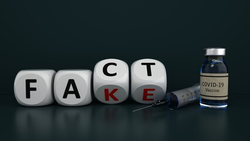
► Compliance and proof; The company can force employees to return to work. It's way to control. The American Federal Health Agency has confirmed its "right" to require them to be vaccinated to do so, because they thus relay the general health policy. But how can companies monitor the effectiveness of these vaccinations? Because when the company thus becomes "prosecutor and judge" of its employees under Regulation Law (health in this case), there are probative questions that arise.
On May 28, 2021, the American federal agency The US Equal Employment Opportunity Commission - EEOC released a statement on whether employers can compel their employers to be back onsite (➡️📝EEOC Issues Updated Covid-19 Technical Assistance. Provided Additional Information on Vaccination, May 28, 2021).
If the New York Times immediately concluded that companies can immediately bring everyone back (➡️📝New York Times, Employers can require workers to get Covid-19 vaccine, US says, June 16, 2021), the Regulatory Agency is more nuanced because it follows the Anglo-American "balance of rights" method.
And the difficulty will probably lie rather in the probative question ...
I. SUBSTANTIAL DEBATE ON THE BALANCE BETWEEN RIGHTS AND FREEDOMS
The first question is about this debate between “rights and responsibilities” of each other.
On the method, first of all: it is a British and American way which consists in balancing: here the "right" of the company to organize as it wants its operation, here conceived rather like a "right" taken from the employment contract, rather than as a unilateral disciplinary power. We know that legal traditions diverge on this essential point.
On June 10, 2021, BBC News relays the order in this direction from Goldman Sachs bank, on the managerial basis that teleworking for everyone would be an "aberration". It therefore expresses its power to organize the company, expressed moreover in a non-public note (➡️📻BBC News, "Goldman bankers ordered to report vaccine status before office return", June 10, 2021).
But it is in terms of balancing subjective rights that a British academic, quoted by the BBC, analyzes the situation: "Vaccinations create a conflict of legal protections, where the freedom of individual choice is weighed against the health and safety of others. "
"Some employees may have a justifiable reason for not wanting to take the vaccine, and we would always urge employers to discuss an employee's reluctance, whether it be related to a disability or religious reasons.".
As soon as we see Compliance through the contract, the analysis takes its foundations.
But the most important debate will be probative.
II. FORTHCOMING PROBATORY DEBATE ON THE EFFECTIVENESS OF VACCINATION
How can we make sure that people are actually vaccinated?
Companies can organize the vaccination themselves.
But people presenting certifications, the risk is great of falsified certifications. The difficulty is already encountered for crossing borders or entering public places, providers of falsified certifications immediately proliferating.
The stake is therefore the pre-constitution of reliable evidence (on the "probationary culture", inseparable from the "Compliance culture", ➡️📝 see Frison-Roche, M.-A., Training: content and container of Compliance Law, in ➡️📘Compliance Tools, 2021).
However, in Law, preconstituted proofs are more "legal proofs" (which do not have for goal truth but rather security and commitment) while the truth of a fact is freely proven Ex Post. This is here the Ex Ante proof of a fact (the vaccine).
The question of "trusted third parties" (and its dark double that is the falsifier) is at the heart of Compliance Law. As he or she manages the detection of risks and the prevention of crises to protect people, the construction of a reliable system, that is to say probative is central.
Proof of vaccinations is just a first example. However, it is up to companies to build this evidence. To design them structurally? To bear the cost?
Undoubtedly yes, since this power exercised over others is conferred so that companies perform their Compliance obligations.
Oct. 16, 2017
Blog
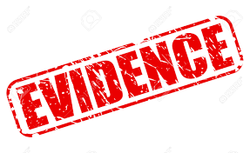
L'arrêt rendu le 6 septembre 2017 par la Cour de Justice de l'Union européenne dans le cas Intell c/ Commission Européenne est exemplaire. Il constitue une leçon de droit, un trame de la façon dont une autorité de sanction doit fonctionner : leçon de procédure, au point de contact entre la forme et le fond que constitue la preuve. C'est en cela que le Droit économique, si inspiré par les théories économiques soit-il, doit satisfaire les principes directeurs du droit les plus fondamentaux comme les plus simples, par exemple : l'Autorité ne peut condamner sans preuve. En effet l'Autorité qui sanctionne se rapproche de la figure du juge, l'entreprise poursuivie se rapproche de celle d'une personne poursuivie, titulaire de droits de la défense et du droit de contredire.
D'une concision et d'une clarté de rédaction à faire rougir la doctrine française qui ne cesse de vanter ces qualités dont on cherche parfois trace dans nos décisions nationale de justice, la CJUE exprime 3 idées claires et nettes.
1. En préalable, la CJUE, réunie en Grande chambre, rappelle que l'Autorité de concurrence n'est pas une Autorité de régulation.
Elle pose que sur un marché concurrentiel, la "concurrence par les mérites" permet à une entreprise de vouloir activement atteindre une position dominante, l'éviction des compétition moins efficace étant un bienfait pour les consommateurs, leur présence sur le marché ayant pas à être protégée.
2. En deuxième lieu, la CJUE reprend la construction entre les objets de preuve, leur pertinence, les charges de preuves et le contradictoire.
- La CJUE affirme que l'Autorité de concurrence doit donc démontrer l'objet ou l'effet, effectif ou potentiel, anticoncurrentiel de la pratique.
- L'Autorité peut pour cela recourir à des "tests", comme ici le test AEC (As Efficient Competitor), mais si elle prend appui sur les résultats de celui-ci et si ces résultats sont contestés par l'entreprise, elle ne peut pas condamner celle-ci sans avoir répondu aux critiques méthodologiques ainsi formulées.
3. En troisième lieu, la CJUE continue de veiller au respect des droits de la défense, principe de procédure par lequel la personne menacée par la décision peut faire valoir ses arguments, articulation donc entre le système probatoire et le fond du dossier.
Et c'est pourquoi au terme de cette leçon, la condamnation a été magistralement annulée.
June 5, 2016
Law by Illustrations

Pour faire comprendre le Droit, l'on peut aussi partir des cas.
Pour faire comprendre un cas, l'on peut aussi partir d'un film racontant le cas.
En 1993, les États-Unis furent secoués par une affaire de meurtre atroce de trois enfants. On soupçonna trois adolescents. Ils furent condamnés en 1994, deux à la réclusion perpétuelle, le troisième à la peine de mort.
L'on peut consulter les pièces du dossier. , ou regarder des vidéos des lieux ou du procès, utilisés par les médias lors qu’après 18 ans de prisons les trois condamnés furent libérés, sans que pour autant leur innocence soit reconnue.
L'on peut regarder le documentaire que deux journalistes, convaincus de l'innocence des trois condamnés, ont réalisé en 2011 pour obtenir cette libération : Paradise lost.
L'on peut regarder la courte audience durant laquelle il fût exigé des trois condamnés qu'ils reconnaissent leur culpabilité pour être libérés, faute de quoi ils resteraient en prison leur vie entière, deal qu'ils acceptèrent.
L'on peut encore regarder le film qui reprend en 2014 le cas : Les trois crimes de West Memphis. Le détective privé y est joué par Colin Firth, Reese Witherspoon incarne la mère de l'un des enfants massacrés.
En contrepoint, l'on peut regarder les interviews que tout au long les personnes condamnées donnèrent à la télévision. En effet, personne ne sût s'ils étaient coupables ou innocents et l'on penche aujourd'hui plutôt pour la thèse de l'innocence ... L'on peut ainsi écouter le principal accusé des crimes qui explique deux ans après la condamnation, ou 18 ans après celle-ci, la destruction de sa vie par la justice de l'Arkansas, affirmant sans cesse son innocence et sollicité pour ce faire par les journalistes vedettes, comme Anderson Cooper.
Ce film est sorti en 2015.
Il montre parfaitement à la fois les imperfections, qui peuvent être terrible, de la justice pénale américaine, mais aussi les effets concrets d'une alliance entre le monde du cinéma et le monde judiciaire.
Lire l'analyse ci-dessous;
Updated: July 31, 2013 (Initial publication: Nov. 8, 2011)
Teachings : Les Grandes Questions du Droit, semestre d'automne 2011

Oct. 26, 1974
Thesaurus : Doctrine
Référence complète : FORIERS, Paul, Présomption et fiction, in Les présomptions et les fictions en droit, Travaux du centre national de recherche logique, Établissements Émile Bruylant, 1974, p. 7-26.
L'article reproduit une conférence faite en 1970. Ce texte est d'une très grande clarté et concision.
lire ci-dessous son résumé.